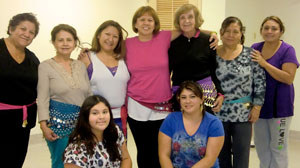Feb 12, 2014
New Jersey Clinic Promotes Healthy Lifestyles
Six years ago, Teresa Bogado's life changed for the better after she attended a “charla” at Zufall Health Center (ZHC) in Dover, NJ. The charla (Spanish word for “talk”), which focused on healthy living and weight management, motivated Bogado to make significant changes in her lifestyle and home meal preparation, resulting in a 40-pound weight loss for her and lower medication dosages for her diabetic husband. ZHC, a federally qualified health center (FQHC), includes lifestyle and weight management counseling, and oral and behavioral health assessments as part of every patient's primary care exam.

Bogado, who teaches Zumba classes at ZHC now, inspires other women to make good health a priority. ZHC's long-term efforts to help patients improve lifestyle and weight management contributed to its selection as one of 50 locations participating in the Healthy Weight Collaborative, a HRSA-funded national effort to develop and share evidence-based clinical interventions to prevent and treat obesity in children and families.
ZHC primary care providers do weight management assessments on patients of all ages. They provide nutrition education, teach patients the Plate Method, help patients set healthy weight goals and equip them with self-management tools to use at home. Parents receive coaching that teaches them the importance of helping children adopt better habits, such as increased physical activity and healthier snacking.
In addition to weight loss and exercise, outreach programs target special populations. BD Direct Relief awarded ZHC a $100,000 grant in recognition of its innovative approach to treating diabetes. ZHC's participation in the Patient Safety and Clinical Pharmacy Services Collaborative (Link no longer available) affiliated with the Alliance for Integrated Medication Management resulted in 67 percent of ZHC patients with diabetes demonstrating improved medication and lifestyle management. Seventy percent of patients with elevated cholesterol levels and 58 percent with high blood pressure also demonstrated significant improvements. A pharmacist and diabetes educator coordinated the program and worked with patients.
ZHC's mobile medical van brings dental care and chronic disease management assistance to area senior public housing sites. For the last three years, ZHC has participated in National Rural Health Day by offering free physical and behavioral health screenings and on-site dental care. Community dentists and hygienists volunteer their time to the cause.
The FQHC serves underprivileged, at-risk residents living in Dover, Morristown and rural communities in Morris, Sussex, Hunterdon, Somerset and Warren counties. Farmworkers are a primary patient population in the rural counties, said Director of Special Populations Michelle Blanchfield. Obesity, poor oral health and depression are common among patients and these conditions are often culturally influenced, according to Blanchfield, who gave as one example the Hispanic viewpoint that babies' and children's chubbiness is a sign of good health.
“Cultural differences, along with language and literacy barriers, make it more challenging to effectively change patient misconceptions related to illness prevention and benefits of having a continuum of care,” Blanchfield said. “These really impact our patients in ways most of us don't realize. Our immigrant population walked everywhere they went, ate out of the fields with their families, and were a support system for each other in their homelands. Once here, they lose that family support. They often are working two jobs and they've never exercised just to stay physically active. They end up eating cheaper, prepared foods that are less healthy. Social issues related to experiences like crossing the border or what they experienced in their homeland contribute to depression and anxiety levels. It's such a drastic lifestyle change. Many gain weight and develop chronic diseases.”
Zufall Health Center became a fully licensed FQHC in 2004 after having operated as a privately owned clinic since 1990. Founder Dr. Robert Zufall, a retired urologist, opened the clinic to meet the needs of underprivileged families. His wife, Kathryn, handled administrative duties and a handful of volunteers assisted them. (Dr. Zufall now serves on the Center's board and writes a column in its Be Well Newsletter entitled “Ask Dr. Bob”). Today ZHC continues that mission of serving patient needs regardless of income or insurance status.
For more information, contact Michelle Blanchfield at mblanchfield@zufallhealth.org.
Back to: Winter 2014 Issue
